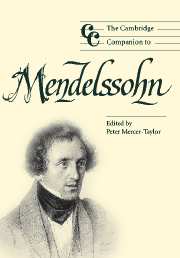Book contents
- Frontmatter
- Introduction: Mendelssohn as border-dweller
- Part I Issues in biography
- 1 Mendelssohn and the institution(s) of German art music
- 2 Mendelssohn and Judaism
- 3 Felix and Fanny: gender, biography, and history
- Part II Situating the compositions
- Part III Profiles of the music
- Part IV Reception and performance
- Notes
- Select bibliography
- Index
2 - Mendelssohn and Judaism
from Part I - Issues in biography
Published online by Cambridge University Press: 28 September 2011
- Frontmatter
- Introduction: Mendelssohn as border-dweller
- Part I Issues in biography
- 1 Mendelssohn and the institution(s) of German art music
- 2 Mendelssohn and Judaism
- 3 Felix and Fanny: gender, biography, and history
- Part II Situating the compositions
- Part III Profiles of the music
- Part IV Reception and performance
- Notes
- Select bibliography
- Index
Summary
In 1974 the distinguished musicologist Carl Dahlhaus published an edited volume called The Mendelssohn Problem: Das Problem Mendelssohn. The book's preface makes reference to the recent increase in attention to the composer in scholarly as well as performing venues, abetted by the 125th anniversary of his death in 1972. To speak of a Mendelssohn renaissance, Dahlhaus emphasizes in his opening sentence, would be a great exaggeration. This gambit would be equally valid today. The title of this 1974 volume – as Dahlhaus must have known when he chose it – raises the red flags of several controversies and confusions, which have likewise remained unresolved in the intervening thirty years. Immediately, it conjures a rhetorical, ideological, and political parallel: the Mendelssohn problem, “the Jewish problem.” If, in other words, there is a “problem” with Mendelssohn the man or with Mendelssohn the music, the titular phrase works only in the shadow of the larger cultural issue. Is Mendelssohn a minor composer? In the present context we must bracket the question. We would not expect ever to read a book about the Puccini problem, the Mascagni problem, or the Rimsky-Korsakov problem. The Meyerbeer problem, perhaps. But that is the point. It is the abiding cultural anxiety of anti-Semitism or about anti-Semitism that casts an aura over these nineteenth-century composers, fusing and confusing the judgments of their cultural and aesthetic validity. Before 1960 and his elevation to canonic status, Gustav Mahler would likely have appeared as the third man in the group.
- Type
- Chapter
- Information
- The Cambridge Companion to Mendelssohn , pp. 26 - 41Publisher: Cambridge University PressPrint publication year: 2004
- 2
- Cited by



